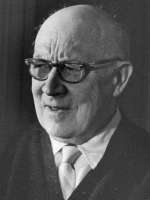Gösta Ekman, Sr. est un Acteur, Réalisateur et Scénariste Suédois né le 27 décembre 1890 à Stockholm (Suede)
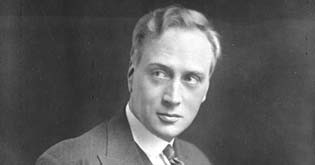
Gösta Ekman, né à Stockholm (Suède) le 28 décembre 1890, décédé à Stockholm (Suède) le 12 janvier 1938, est un acteur suédois.
Le père de l'acteur Hasse Ekman est également le grand-père de l'acteur Gösta Ekman Jr. (1939-), de l'acteur Stefan Ekman (1944-), et du réalisateur Mikael Ekman (1943-) — ce dernier, lui-même père de l'actrice, productrice et danseuse Sanna Ekman (1965-).
Known as a self-taught master of disguise with theatre make-up and costumes, Gösta Ekman was equally convincing as a farmer's son, an 18th-century middle-aged aristocrat, or an 80-year-old lunatic. Furthermore, he played in comedies, tragedies, dramas, and operettas. As a result, it was believed that he was capable of being convincing in all genres and as all types of characters. At different times, he also ran and supervised several private theatres in Stockholm, including the Oscarsteatern, the Vasateatern, and the Konserthusteatern. He was also head of the Gothenburg City Theatre in the 1930s. At the Vasateatern, which he ran from 1931 to 1935, he both directed and played the lead in several plays, while also producing a large number of productions. As a result, his time at the Vasateatern is considered to be the peak of his stage career. He first entered the stage as an extra in an operetta in 1907, but made his professional stage debut in the renowned Selander Company in 1911. The ghost of Gösta Ekman is still said to haunt his former dressing room at the theatre.
Ekman started in films at the dawn of the Swedish film industry and played an important role in its development. One of his first film roles was in Victor Sjöström's experimental film Trädgårdsmästaren (1912). Later, he played the lead in the first Swedish talkie, För hennes skull (1930). Ekman also acted in two films that would gain international recognition: F. W. Murnau's silent film classic Faust, where he played the title character, and in the original 1936 version of Intermezzo, where he played a world famous violinist opposite Ingrid Bergman in her breakout role. But they had in fact already acted opposite each other in the Swedish 1935 movie Swedenhielms Family where they share a couple of wonderful scenes alone together as their characters have a heart-to-heart conversation on life and love; among the most memorable moments in the film.
His best on-screen credit is often said to be his King Charles XV/Leonard Pettersson in film comedy Kungen kommer (1936), where Ekman masterfully plays a double-role in the film; first the king and then also the king's lookalike; an actor who is hired by members of the Royal Court to impersonate His Majesty at a private party. Naturally the real king later arrives at the party causing a number of confusions and comic mix-ups.
Ekman also made a number of successful song recordings from his revue numbers, including songs "En herre i frack" (1935) - perhaps his most popular recording - and "Kvinnor och champagne" (Women and Champagne) in 1929.
Personal life
Early on, Gösta Ekman was labeled as a workaholic, sacrificing himself for his art and for his love of the theatre. Later, as his fame increased, his workload also increased. During the day, he would rehearse and direct plays. In the evening, he played leading roles in stage plays. Later at night, he would film. This busy schedule left him with relatively little free time. Furthermore, the free time he did have was spent carrying out his duties as the administrative director of the theatres he ran.
In 1926, while filming Faust in Berlin, he was introduced to cocaine by two Scandinavians, who told him that cocaine would help him cope with his work schedule better. Sadly, this began a long-term drug addiction for the actor that slowly deteriorated his health and eventually caused his death 12 years later at the age of 47.
In 1914, Gösta Ekman married Greta Sundström. Later, Greta gave birth to Hasse Ekman, who came to be one of Sweden's most successful film directors in the 1940s and 1950s. Gösta Ekman's grandson, Gösta Ekman, Jr., has also become well-known through his career as an actor and is considered to be one of Sweden's very finest actors. One of Hasse Ekman's movies, The Royal Rabble from 1945 about a famous acting family, was partly based on his own upbringing in an acting family.
Source : Wikidata
Gösta Ekman, Sr.

Nom de naissance Frans Gösta Viktor Ekman
Nationalité Suede
Naissance 27 décembre 1890 à Stockholm (Suede)
Mort 12 janvier 1938 (à 47 ans) à Stockholm (Suede)
Récompenses Litteris et Artibus
Nationalité Suede
Naissance 27 décembre 1890 à Stockholm (Suede)
Mort 12 janvier 1938 (à 47 ans) à Stockholm (Suede)
Récompenses Litteris et Artibus
Le père de l'acteur Hasse Ekman est également le grand-père de l'acteur Gösta Ekman Jr. (1939-), de l'acteur Stefan Ekman (1944-), et du réalisateur Mikael Ekman (1943-) — ce dernier, lui-même père de l'actrice, productrice et danseuse Sanna Ekman (1965-).
Biographie
CareerKnown as a self-taught master of disguise with theatre make-up and costumes, Gösta Ekman was equally convincing as a farmer's son, an 18th-century middle-aged aristocrat, or an 80-year-old lunatic. Furthermore, he played in comedies, tragedies, dramas, and operettas. As a result, it was believed that he was capable of being convincing in all genres and as all types of characters. At different times, he also ran and supervised several private theatres in Stockholm, including the Oscarsteatern, the Vasateatern, and the Konserthusteatern. He was also head of the Gothenburg City Theatre in the 1930s. At the Vasateatern, which he ran from 1931 to 1935, he both directed and played the lead in several plays, while also producing a large number of productions. As a result, his time at the Vasateatern is considered to be the peak of his stage career. He first entered the stage as an extra in an operetta in 1907, but made his professional stage debut in the renowned Selander Company in 1911. The ghost of Gösta Ekman is still said to haunt his former dressing room at the theatre.
Ekman started in films at the dawn of the Swedish film industry and played an important role in its development. One of his first film roles was in Victor Sjöström's experimental film Trädgårdsmästaren (1912). Later, he played the lead in the first Swedish talkie, För hennes skull (1930). Ekman also acted in two films that would gain international recognition: F. W. Murnau's silent film classic Faust, where he played the title character, and in the original 1936 version of Intermezzo, where he played a world famous violinist opposite Ingrid Bergman in her breakout role. But they had in fact already acted opposite each other in the Swedish 1935 movie Swedenhielms Family where they share a couple of wonderful scenes alone together as their characters have a heart-to-heart conversation on life and love; among the most memorable moments in the film.
His best on-screen credit is often said to be his King Charles XV/Leonard Pettersson in film comedy Kungen kommer (1936), where Ekman masterfully plays a double-role in the film; first the king and then also the king's lookalike; an actor who is hired by members of the Royal Court to impersonate His Majesty at a private party. Naturally the real king later arrives at the party causing a number of confusions and comic mix-ups.
Ekman also made a number of successful song recordings from his revue numbers, including songs "En herre i frack" (1935) - perhaps his most popular recording - and "Kvinnor och champagne" (Women and Champagne) in 1929.
Personal life
Early on, Gösta Ekman was labeled as a workaholic, sacrificing himself for his art and for his love of the theatre. Later, as his fame increased, his workload also increased. During the day, he would rehearse and direct plays. In the evening, he played leading roles in stage plays. Later at night, he would film. This busy schedule left him with relatively little free time. Furthermore, the free time he did have was spent carrying out his duties as the administrative director of the theatres he ran.
In 1926, while filming Faust in Berlin, he was introduced to cocaine by two Scandinavians, who told him that cocaine would help him cope with his work schedule better. Sadly, this began a long-term drug addiction for the actor that slowly deteriorated his health and eventually caused his death 12 years later at the age of 47.
In 1914, Gösta Ekman married Greta Sundström. Later, Greta gave birth to Hasse Ekman, who came to be one of Sweden's most successful film directors in the 1940s and 1950s. Gösta Ekman's grandson, Gösta Ekman, Jr., has also become well-known through his career as an actor and is considered to be one of Sweden's very finest actors. One of Hasse Ekman's movies, The Royal Rabble from 1945 about a famous acting family, was partly based on his own upbringing in an acting family.
Le plus souvent avec
Filmographie de Gösta Ekman, Sr. (15 films)
Acteur
 , 1h49
, 1h49Réalisé par Tage Danielsson
Genres Comédie
Thèmes Peinture
Acteurs Gösta Ekman Jr., Hans Alfredson, Gösta Ekman, Sr., Lena Olin, Margaretha Krook, Bernard Cribbins
Note72%





Il s'agit d'une comédie farfelue, bien différente des faits historiques et de la biographie du peintre. Les faits majeurs de la vie de Picasso, ainsi que les principaux personnages qui l'ont entouré, sont utilisés pour construire une intrigue burlesque qui repose sur des rebondissements, sous forme de chapitres.

Face à face (1976)
, 1h54Réalisé par Ingmar Bergman
Origine Suede
Genres Drame, Fantasy, Horreur
Thèmes Magie
Acteurs Liv Ullmann, Erland Josephson, Gunnar Björnstrand, Aino Taube, Gösta Ekman, Sr., Kristina Adolphson
Note74%





Dr. Jenny Isaksson (Liv Ullmann), psychiatre comme son mari, est harcelée par le doute.

Intermezzo (1936)
, 1h33Réalisé par Gustaf Molander
Genres Drame, Drame romantique, Romance
Thèmes La musique, Lié à la musique classique, Musique
Acteurs Gösta Ekman, Sr., Ingrid Bergman, Inga Tidblad, Erik "Bullen" Berglund, Anders Henrikson, Hugo Björne
Rôle Professeur Holger Brandt
Note64%





Holger Brandt, violoniste mondialement connu, revient dans sa famille après une tournée. Lui et sa femme sont mariés depuis de nombreuses années, mais leur amour s'est estompé. Leur fille a un nouveau professeur de piano, Anita Hoffman. M. Brandt tombe amoureux d'elle et ils partent ensemble en tournée mondiale, mais il découvre bientôt que les sentiments pour sa femme qu'il croyait éteints ne le sont pas.

Kungen kommer (1936)
, 1h21Genres Drame, Comédie
Acteurs Gösta Ekman, Sr., Birgit Tengroth, Nils Wahlbom, Gull Natorp, Åke Ohberg, Thor Modéen
Rôle Leonard Pettersson / Carl XV
Note47%





It is the year of 1865 and the Löwencreutz family are expecting a very prominent visitor, King Charles XV is coming to stay. However Carl Henrik von Grimm reads a telegram stating that the King is in fact cancelling his visit.

Swedenhielms (1935)
, 1h28Réalisé par Gustaf Molander
Origine Suede
Genres Drame, Comédie
Thèmes Théâtre, Adaptation d'une pièce de théâtre
Acteurs Gösta Ekman, Sr., Tutta Rolf, Ingrid Bergman, Karin Swanström, Sigurd Wallén, Mona Geijer-Falkner
Rôle professeur Rolf Swedenhielm
Note57%





Le film est le récit de la vie d'une famille de l'aristocratie suédoise sur le déclin, les Swendenhielms. Aveuglés par les anciens privilèges dont a pu bénéficier leur famille, les enfants et le père vivent bien au dessus de leurs moyens et s'en remettent à la fois à leur bonne de maison, Boman, et à une éventuelle récompense du prix Nobel pour le père, scientifique renommé, afin d'éviter la faillite.
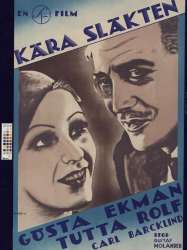
Chère famille (1933)
, 1h34Réalisé par Gustaf Molander
Origine Suede
Genres Comédie
Thèmes Théâtre, Adaptation d'une pièce de théâtre
Acteurs Gösta Ekman, Sr., Tutta Rolf, Carl Barcklind, Thor Modéen, Edvin Adolphson, Dora Söderberg
Rôle Claes af Leijonstam
Note55%





La relation entre un riche grossiste et ses trois filles est mise à l'épreuve alors qu'ils jonglent avec les affaires et les difficultés financières.
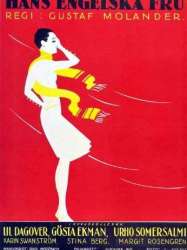
His English Wife (1927)
, 2h30Réalisé par Gustaf Molander
Genres Drame, Romance
Acteurs Lil Dagover, Gösta Ekman Jr., Gösta Ekman, Sr., Karin Swanström, Urho Somersalmi, Brita Appelgren
Rôle Ivor Willington
Note60%






En perfekt gentleman (1927)
, 1h57Réalisé par Gösta Ekman, Sr., Vilhelm Bryde
Genres Drame
Acteurs La Jana, Gösta Ekman, Sr., Karin Swanström, Hans Albers, Gull Natorp
Rôle Marquis Robert de Luny & Jean Coubert
Note55%





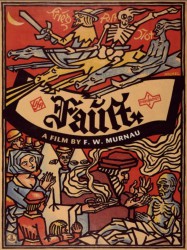
Faust, une légende allemande (1926)
, 1h40Réalisé par Friedrich Wilhelm Murnau
Genres Drame, Science-fiction, Fantasy, Horreur
Thèmes Poésie, Religion, Diable, Adaptation d'un poème, Adaptation d'une pièce de théâtre
Acteurs Gösta Ekman, Sr., Emil Jannings, Camilla Horn, William Dieterle, Frida Richard, Yvette Guilbert
Rôle Faust
Note80%





Les termes du pari sont que Méphisto doit parvenir à corrompre l’âme d’un homme de bien et détruire en lui tout ce qu’il y a de divin et alors la Terre sera sienne. Lorsque son choix est arrêté, il envoie la peste détruire le village de Faust. Devant un tel fléau Faust prie pour que la mort et les privations cessent mais rien ne se passe. Désespéré, il en vient à appeler le diable. Celui-ci lui propose le marché suivant : une période d’essai de 24 heures durant laquelle Méphisto sera à son service. Faust accepte et demande de sauver les villageois. Cependant, ceci vient avec un prix ; Faust ne peut plus s’approcher de tout ce qui est divin. Et quand les malades le découvrent, ils le bannissent. Faust décide de faire un second marché avec Satan : jeunesse, les plaisirs terrestres et royaumes contre son âme. L’échange est scellé avec la duchesse de Parme. Avec le temps, Faust se lasse de ses excès et aimerait revoir sa ville. Obligé d’obéir, Méphisto le ramène. Quand ils arrivent, les cloches de la cathédrale sonnent, la messe se termine. Sur le parvis, Faust est attiré par une jeune fille. Il en tombe amoureux mais il est contraint de fuir quand on l’accuse du meurtre de son frère. Derrière ces machinations se trouve Méphisto qui voit d’un mauvais œil la romance de Faust et Gretchen. Sans famille, Gretchen qui attend l’enfant de Faust devient une paria. Bien plus tard, on la voit errer dans les rues au milieu d’un vent glacial avec son enfant. Les habitants refusent de les aider. Et dans un moment de folie, elle oublie son enfant dans la neige. À l’aube, la cité, voyant l’enfant mort, l’accuse et la condamne au bûcher. Elle appelle alors Faust. Il ne perd aucun instant pour la retrouver mais cela ne sert à rien. Souhaitant n’avoir jamais demandé d’être jeune, il se jette aux pieds de Gretchen. Le diable lui accorde ce dernier vœu. Gretchen reconnaît en ce vieillard son amant alors que les flammes les encerclent. L’ange dévoile à Méphisto qu’il a perdu son pari puisque l’amour triomphe de tout.

Charles XII (1925)
, 2h16Réalisé par John W. Brunius
Origine Suede
Genres Drame, Historique
Acteurs Gösta Ekman, Sr., Bengt Djurberg, Augusta Lindberg, Mona Mårtenson, Pauline Brunius
Rôle Karl XII
Note68%





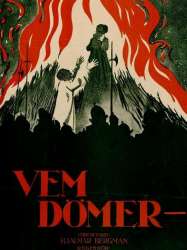
L'Épreuve du feu (1922)
Réalisé par Victor Sjöström
Origine Suede
Genres Drame
Acteurs Jenny Hasselquist, Ivan Hedqvist, Tore Svennberg, Gösta Ekman, Sr., Nils Asther, Edvin Adolphson
Rôle Bertram
Note67%





La jeune fille Ursula est contrainte d'épouser un homme plus âgé qu'elle déteste.

Le Chevalier errant (1921)
Réalisé par John W. Brunius
Origine Suede
Genres Drame, Historique
Acteurs Gösta Ekman, Sr., Mary Johnson, Vilhelm Bryde, Gösta Cederlund, Gull Natorp, Greta Garbo
Rôle Lars Wiwalt
Note67%






Les Traditions de la famille (1920)
, 1h27Réalisé par Rune Carlsten
Origine Suede
Genres Drame
Thèmes Théâtre, Adaptation d'une pièce de théâtre
Acteurs Tora Teje, Gösta Ekman, Sr., Mary Johnson, John Ekman
Rôle Ernst

Le Chat botté (1918)
Réalisé par John W. Brunius
Origine Suede
Genres Comédie
Acteurs John W. Brunius, Gösta Ekman, Sr., Mary Johnson, Carl Schenstrøm
Rôle Karl Konstantin Kattrup
Note50%





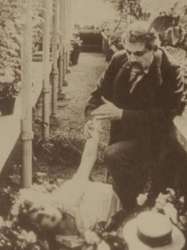
Le Jardinier (1912)
, 34minutesRéalisé par Victor Sjöström
Genres Drame
Acteurs Victor Sjöström, Gösta Ekman, Sr., Lili Bech, John Ekman, Mauritz Stiller
Rôle leur fils
Note58%





Le fils d'un riche horticulteur se fiance avec la fille d'un vieil employé de son père. L'horticulteur ne voit pas d'un bon œil cette relation et trouve le moyen d'éloigner brutalement son fils ; mais un soir le père moleste la jeune fille et tente de l'agresser sexuellement. Ensuite à la suite d'un différend, l'horticulteur renvoie le père de la jeune fille. Le père et la fille trouvent refuge auprès d'un vieil officier très âgé. Le père meurt bientôt et le vieux militaire prend la jeune fille à son service, la traitant finalement comme sa fille. Quand le vieil homme vient à mourir à son tour, ses héritiers chassent la jeune fille de la maison et celle-ci tombe dans une vie dissolue. Un jour, dans un accès de désespoir, elle s'introduit dans la serre de l'horticulteur et détruit toutes ses fleurs. Elle est retrouvée morte au petit matin.
 Connexion
Connexion

